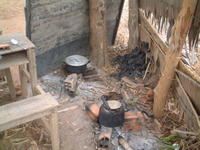 * Kampong Speu Province, Cambodia: Bunna puts down his chalk. He has just finished explaining a math solution to his students. He glances at his watch.
* Kampong Speu Province, Cambodia: Bunna puts down his chalk. He has just finished explaining a math solution to his students. He glances at his watch.Ten past eleven.
All the classrooms at Tnol Bott Primary School are already empty, except for his. “Those who have completed all the note-takings can leave,” he says, turning toward his seemingly bored, tired, a little irritated, and ready-to leave-even-if-they-have-yet-to-complete-their-note-taking students. “By the way, is the rice cooked?”
It’s not an unusual question, and Bunna’s been repeating the same phrase during or after his session for almost a year now. The students, too, know the question well. Sometimes they’d tell him that it’s already cooked without even having to be asked.
About 20 met
 res away in front of Bunna’s class, lie several piles of bricks, arranged in two triangular shapes, an old dirty cooking pot, an old rusty, antique-like kettle, and a piece of used window covering the bricks.
res away in front of Bunna’s class, lie several piles of bricks, arranged in two triangular shapes, an old dirty cooking pot, an old rusty, antique-like kettle, and a piece of used window covering the bricks.His kitchen.
This is where the students cook him rice and boil him water. Adjacent to the “kitchen” lie two old dirty tables joint together;this place has no cover, nor roof. His open dining hall. This is where he has lunch and sometimes his dinner at night if he doesn’t return home.
His school---Tnol Bott Primary School---is located in a rather remote area of the province, 27 Km from the central town (where he lives) and 7 Km down from the National Road 4. Everyday he’d wake up early in the morning, pull out his second-hand Honda Daelim and drive 27 Km down to his school.
It usually takes him 40 minutes to reach his work place. The road to his school is still in its bad condition: bumpy and dusty in dry season; muddy and slippery in rainy season. He says the worst thing is when he has to sail his vehicle across the flooding road during some rainstorm days. Occasionally, though, when Bunna wakes up late, it takes him lesser time as he’d speed his Honda Daelim as fast as possible to get to school on time, no matter how dangerously bumpy or slippery the road is.
 He’s a new recruit. He’s been teaching here for only a year and a half, but he wanted to quit teaching since the first sixth month.
He’s a new recruit. He’s been teaching here for only a year and a half, but he wanted to quit teaching since the first sixth month.“Basically, all new primary school teachers like me earns as much as 70000 Riel (18$) a month,” Bunna explains, “but I have to spend 6000Riel (1.5$) a day on gasoline for going back and forth, not to mention the money I have to spend on lunch everyday. I see no gain in doing this. So, what's the point of continuing to teach?”
The school knows his problem; they are already in shortage of teachers. So, to encourage him to keep coming to school as well as to help reduce his every day’s expense , on a voluntarily basic, students agree---despite the fact that their families are so poor--- that each of them would bring one or two kilos of rice each month to school and cook for him. In one or two weeks some students would hand him one or two of their home-raised chickens as a bonus for his dinner.
Most of the students come from rural, impoverished families with low educational backgrounds. Yet, Bunna says he could still see in their eyes--- the eyes that hunger for knowledge and the need for proper education.
Being an educator himself, he says, he is very well aware of the value and the role of education. He doesn’t want to see those kids quitting school at such an early age. Yet, anywhere, anytime, hunger and basic needs seem to be ahead of every thing else.
“Even with the help of the school, I still could not support myself; meaning I still live on my parent’s money,” he says, “I feel the need to live a proper life, an ordinary life, if not a luxurious one, just like others.” With the salary as little as 18$ a month he knows his life is too far below the so-called “ordinary line.”
Hence he’s now divided between the ideas of staying on with the job waiting for the government to increase the salary, and finding a second job with just a slightly better salary and quit teaching.
There is, however, good news for Bunna. Last year the government promised to increase 15% of the total salary to all civil servants by 2006. But such a raise is too small for him and, as he says, “it won’t make any thing better.” He says he’d probably be much happier with the plan if he earned 2000$ a month just like all the Cambodian parliamentarians do.
The Cambodian Independent Teachers Association, which was founded in 2000 and now counts 2,500 teachers as members in several provinces, has urged the government to raise teacher salaries to $100 per month[The Cambodia Daily , WEEKEND Saturday, January 10-11 2004]. But prime minister Hun Sen mentioned again in a speech last month that the government is too poor to afford to do so. “If we want to raise 100$ for teachers, we’ll have to reduce the numbers of the whole teachers from 70000 to 10000,” he says.
Back to Tnol Bott Primary School, Bunna just got back from a nearby shop with a small plastic bag full of local foods in his hand. He usually spends about 1000Riels (0.3$) a day on food. “The foods are almost the same everyday, but the dining hall is cool, completely open with fresh and natural air,” he jokes.
But Bunna says he doesn’t know if he will have to buy the same food, have lunch on the same old dirty tables, drive the same old second hand Honda Daelim, and live on his parent’s money for the rest of his career. And yet for him the hope of getting 100$ a month seems far away.
That is unbelievable!! How come Cambodian parliamentarians receive $2000 a month and teachers only receive $20?? It really annoyed me seeing this figure, teachers deserve more than this. Surely the government has more to offer to teachers by REDUCING their salaries (and reducing/eliminating corruptions), honestly they don’t deserve $2000 – they haven’t done much for Cambodia and her peoples yeah. But again they just want to make life harder for teachers. My opinion is they want to create adversity for teachers and students in the rural therefore both students and teachers will leave school. Hey, the Vietnamese government is in control of the Cambodian government, I don’t think they want to see too many educated Cambodian children.
This comment has been removed by a blog administrator.
This comment has been removed by a blog administrator.
This comment has been removed by a blog administrator.
This comment has been removed by a blog administrator.
This comment has been removed by a blog administrator.
This comment has been removed by a blog administrator.
It is really interesting topic. This is the very real life of the teacher who will only dream about the increasing of salary but that never come true..Hum,,what is the solution??
This comment has been removed by a blog administrator.
This comment has been removed by a blog administrator.
Great post!
This is so unfair for teachers who teach under-tertiary course, especially the ones in rural parts of the country. And this is why the education quality is getting worse each day. I can say it's touching the ground now.
You know how funny it is that we have schools and classes while we don't have enough teachers to fill up that places. They build school but at the same time they don't encourage teachers to do their jobs in form salary and the value of their jobs. So what's the point in building that schools for?
Great story...thanks.
I think the teachers deserve $75-100/month. Yes, I heard of young teachers not wanting to go rural areas. Yet, rural children have no teacher. They need those teachers. What will the future of Cambodia be if the rural children not educated? Cambodian government really has to do something about this.
Also, I heard similar things about our soldiers stationed at the borders in the jungle. They are far away from towns, no medicine, and very low pay. Also the area is infested with malaria and dengue fever.
You know the real heroes in Cambodia are the ordinary Cambodians who work and give their all to their country because they care. Cambodia has to do something to support them; otherwise, there will be no one to give a damn about the country.
What's with all the adverts disguised as comments. Sooo annoying.
This comment has been removed by a blog administrator.
I want to delete the annoying ads, but don't know how. Any idea please,
Hi Seserek,
Saw you we're on my site last night, subsequently I checked yours. Your post on teachers in Cambodia was touching and sad, to say the least. I wish I could write as well as you, considering it's my native language. Keep up the great work!!! I have posted a link to your story and blog on my site.
www.johnmalloy.blogspot.com
Don't know how to remove the slog (spam ad's) on the blog, I have the same junk. Will let you know if I find out.
All the Best,
John Malloy
thenetworknewspaer@gmail.com
Canada
http://help.blogger.com/bin/answer.py?answer=1081&topic=23
to remove comment(s)
Hope this helps!!!
Thank you ver much for the helpful link. Now I'm done with the spam ads.Also thanks a lot for posting my story and blog at your site.
Your very welcome Seserak, thank you.
If you have any pictures of young people with thier pets, my 6 year old daughter Keeley, would like to put them on her blog.www.keeleyspetpals.blogspot.com
You can send to
thenetworknewspaper@gmail.com
All the Best,
John Malloy
Great story...
Very nice and interesting post...and I am surprised the government acts the way it does, not increasing salary for the teachers...kids in school, having an education is the futur of your country
Since this article is a few years old I wonder if the situation has improved now.